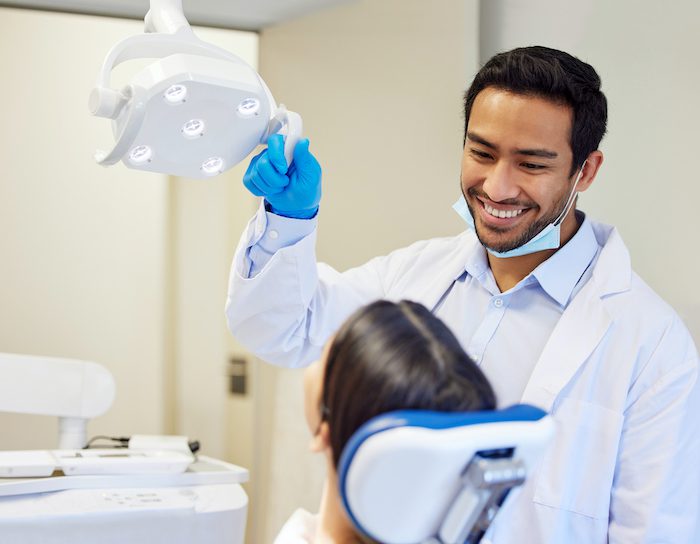Our top priority is to ensure that everyone in our office is comfortable and relaxed in our care. We recognize that some patients have dental fear or anxiety, and visiting the dentist office can be hard for them. Stone Creek Dental provides sedation dentistry as one of our general dental services. It benefits many different types of patients so that they can get the dental care they need.

Sedation Dentistry in Denton, TX
The sedation process differs depending on your level of anxiety and the procedure(s) you’re getting done. We’ll start with a consultation and discuss your issues when you visit the dentist office. It’s essential to know your level of anxiety or if you have problems with a bad gag reflex. The number and severity of procedures factor into the decision, too.
We also look into your medical history and ensure you can safely have sedation. Certain medical conditions may prevent sedation from being an option for you.
Types of Dental Sedation
There are multiple different types of dental sedation. The most mild form is nitrous oxide, better known as laughing gas. It’s the only sedation option where you can drive yourself to and from your appointment. It takes effect very quickly and dissipates quickly as well. You’re only under the sedation effect when you’re actively breathing in the gas. We place a cannula or mask over your nose so that you inhale it throughout the procedure.
Patients describe the feeling of this sedation as mild euphoria and an overall relaxed state. You won’t be completely under, but you won’t care about anything happening around you. You’ll feel normal again once you take a few breaths without the mask.
Oral conscious sedation uses a prescribed pill given before you come into the office for the procedure. Pills can be antianxiety medications or sedatives, depending on the level of anxiety. You’ll be conscious throughout the procedure but may fall asleep or don’t remember parts of it.
IV sedation is the deepest form of sedation. We only use it for patients with severe anxiety or those getting multiple intensive procedures in one sitting. You’re conscious but unaware of your surroundings and don’t remember the procedure. We monitor you throughout to ensure your vitals are good and the procedure goes smoothly.
Who Benefits From Dental Sedation?
Sedation is most commonly used for patients who suffer from dental anxiety. Dental fear occurs on a spectrum. Some patients may only have issues with certain sounds or dental tools, while others suffer from fear so debilitating they can’t even come in for a regular checkup. Avoiding regular dental care makes you more likely to have more severe dental problems in the future. Sedation allows patients who fear the dentist to get regular care or the more intensive procedures they may need from years of neglect.
But sedation isn’t only useful for anxious patients. Patients with movement disorders or young children may have issues getting the care they need successfully. Dentistry is delicate and uses sharp instruments. If the patient moves involuntarily, it is hard for the dentist to work safely. Sedation relaxes the involuntary movements so that you can get dental care safely.
This is also true for patients who have bad gag reflexes. A gag reflex fights the dentist throughout the entire treatment session. It also makes the procedure incredibly uncomfortable for the patient. Sedation relaxes the reflex, making treatment more comfortable for everyone involved.
We use dental sedation for patients getting multiple dental procedures in one sitting. It keeps patients relaxed and makes sitting in the dental chair for a long time easier. When patients are calm and sedated, we can perform our jobs more quickly and efficiently.
Sedation Dentistry FAQs
Sedation dentistry can make dental work easier for a variety of different patients. Learn more by reading the answers to these commonly asked questions.
How long does it take to recover from dental sedation?
It depends on the type of sedation you’re getting. With nitrous oxide, the effects dissipate quickly. It should only take 15-30 minutes for you to fully recover from sedation. With deeper sedation, you may need 24 hours to fully recover. Everyone responds to anesthesia differently, so some patients may take longer to recover than others.
What are the side effects of dental sedation?
Sedation can have mild side effects. Most commonly, you’ll get a dry mouth and lingering drowsiness. Other side effects include nausea and headaches, particularly if you’re sensitive to the medication used. If you experience more severe side effects, call our office immediately. There’s a risk of having an allergic reaction to the medication.
Will I be asleep under dental sedation?
No, sedation dentistry doesn’t completely put you to sleep. You’re still conscious, and in some cases, fully aware of what’s happening around you. Sometimes you can answer questions the dentist may have. However, some sedation can make you relaxed enough that you do fall asleep while you’re getting treatment.
Will I feel pain with dental sedation?
No. We utilize local anesthetics along with dental sedation to ensure that you don’t experience pain during the procedure. We use your height, weight, and medical history to determine the right amount of sedation for you. The proper dose guarantees that you stay sedated and comfortable throughout the entire procedure.
Will I be able to remember my procedure?
Many patients don’t remember much of their treatment under sedation. Your sense of time is also skewed when you’re sedated. You may think that it’s only been 5-10 minutes when you’ve been getting treatment for an hour or two.
Am I a good candidate for sedation dentistry?
Many patients are eligible for sedation for dental procedures. However, some medical conditions may make it unsafe. If you’re obese or have sleep apnea, you’re at higher risk for complications when using sedation. Anesthesia can complicate fetal development, so pregnant women should avoid it as well.
Does dental sedation help with the gag reflex?
Yes, dental sedation can help reduce the gag reflex. When you have a strong gag reflex, it can be tough to get dental work done. Sedation helps relax your body and mind. This calm state makes it easier for the dentist to do their job without causing gagging. The dentist might use different kinds of sedation, like laughing gas or oral medicine, to help make your visit more comfortable and smoother.
Does dental insurance cover sedation dentistry?
Dental insurance can sometimes cover sedation dentistry, but it depends on your plan. Many plans cover basic sedation, like laughing gas, especially during kids’ treatments. More complex sedation, like IV sedation, might not be fully covered. Please check with your dental insurance company to see if they will cover dental sedation and which type. We can help explain the details of your coverage before starting treatment.
What procedures are best suited for dental sedation?
Dental sedation can help with procedures that might be uncomfortable or make people nervous. Common times for sedation are during tooth removal, like wisdom teeth, or when getting a root canal. Your dentist can also use it for deep cleaning to treat gum disease or when it’s hard to stay still in the dental chair. For longer procedures, sedation helps keep you relaxed. We will help you choose the right type of sedation based on how long the work will take and your level of anxiety.
Schedule an Appointment
Sedation dentistry can benefit a wide variety of different patients. Call us to schedule an appointment and learn more.
